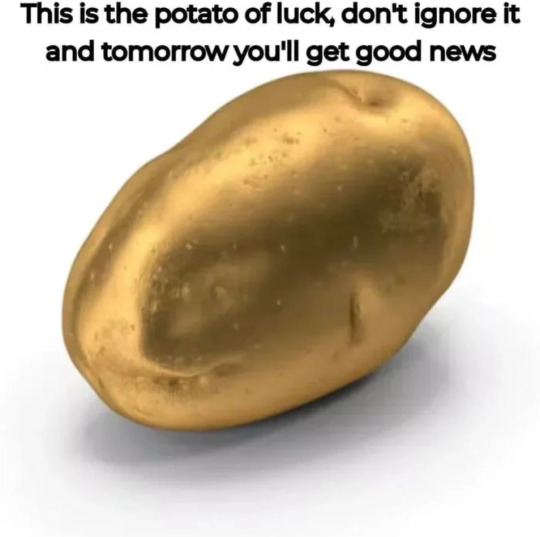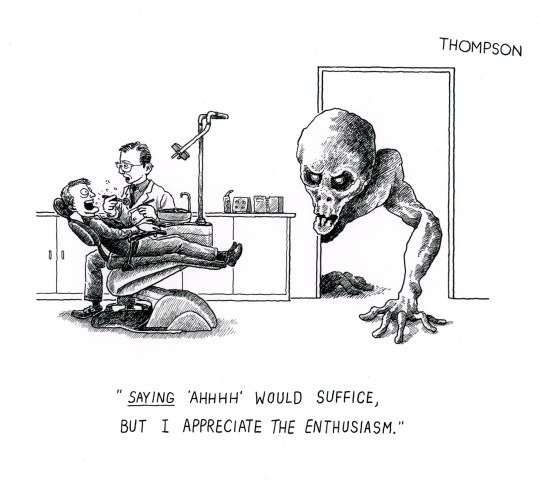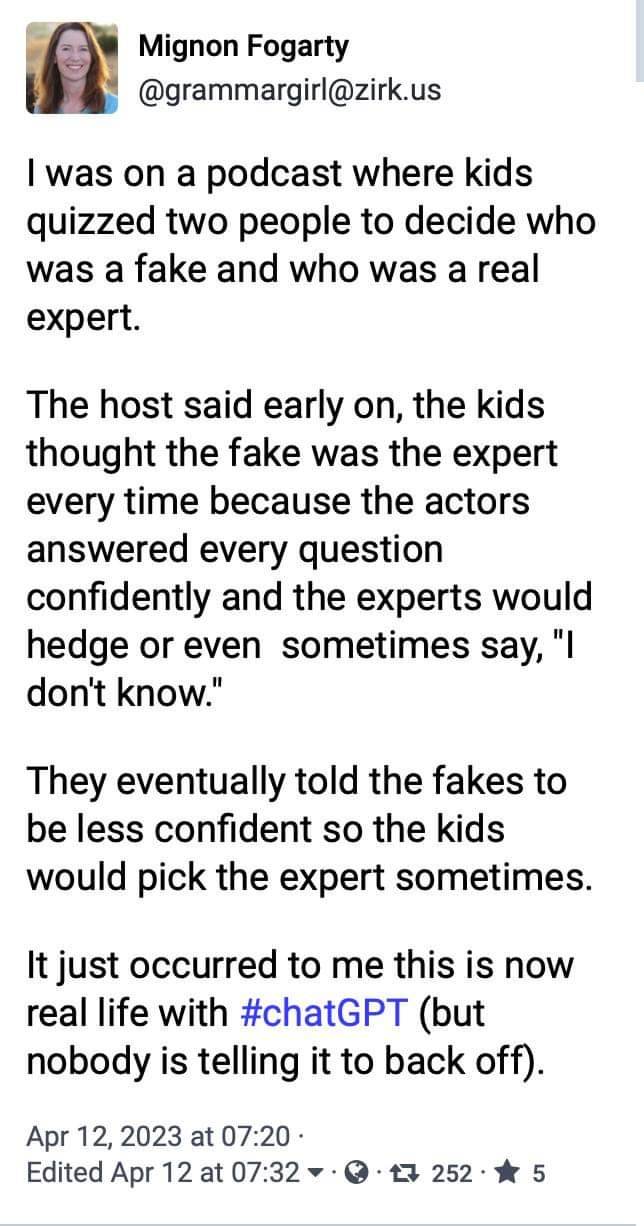Also known as Kat Day, and sometimes as ChronicleFlask. She/her.Chemistry PhD, writer and editor of science and fiction. Assistant editor at PseudoPod. 90% scientist, 10% witch. Try not to annoy the witch part.
Don't wanna be here? Send us removal request.
Photo
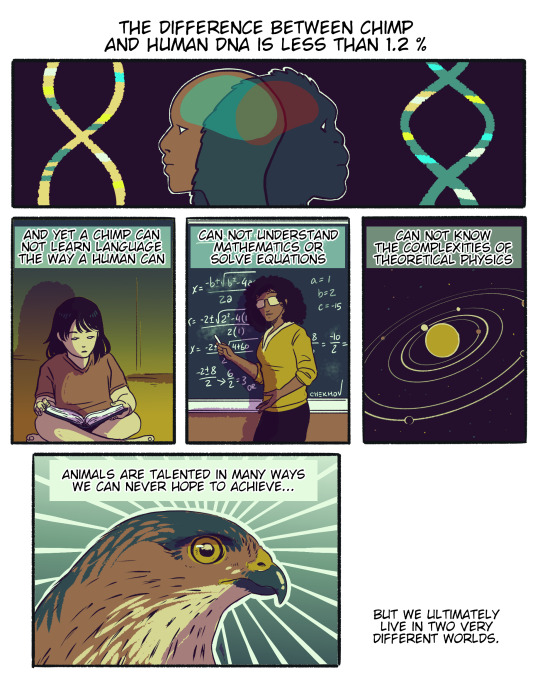
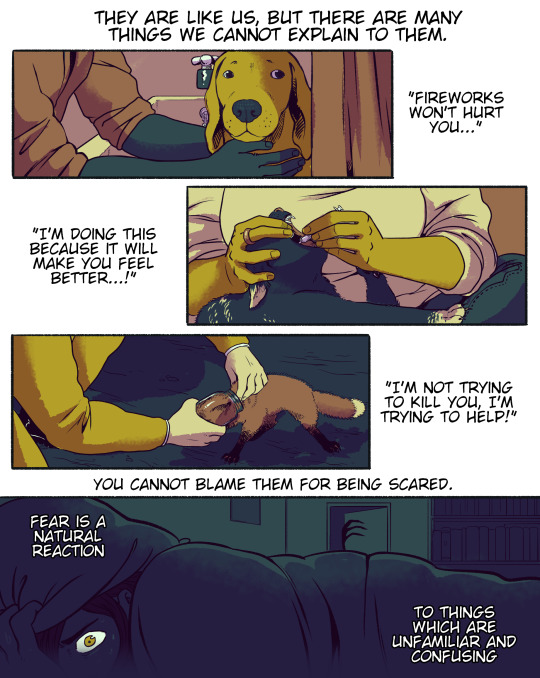

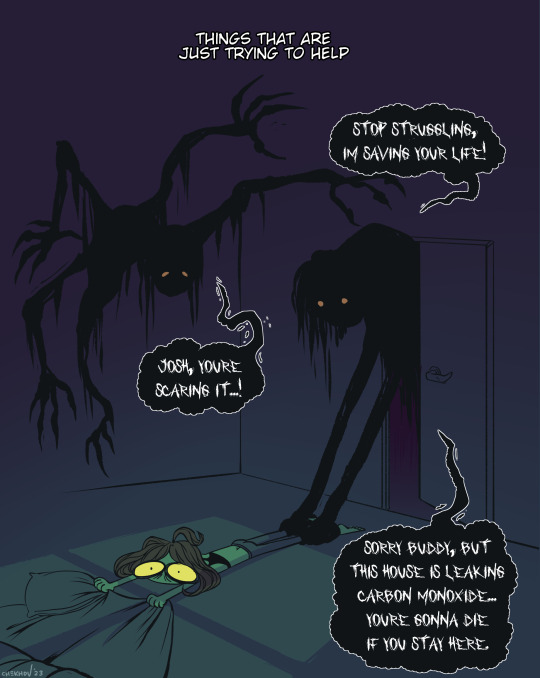
if you think about it, every time we tranquilize animals to transport them safely to another place, we are the sleep paralysis demon
166K notes
·
View notes
Text
Why Good Omens season 1 has already fulfilled Sir Terry Pratchett's wish
Neil Gaiman said he wouldn't make a sequel to Good Omens
Neil Gaiman at SXSW in Austin, Texas in 2019:

[Gaiman also confirmed the series will only be six episodes, with no intention of trying to go for another season if successful. "The lovely thing about Good Omens is it has a beginning, it has a middle, and it has an end," he said to appreciative applause. "Season 1 of Good Omens is Good Omens. It's brilliant. It finishes. You have six episodes and we're done. We won't try to build in all these things to try to let it continue indefinitely."]
Source: Entertainment Weekly (2019)
2018 - Neil Gaiman on X- Twitter

Tweet link here

Also Neil Gaiman in 2023:

["It won't be confirmed unless enough people watch Season 2 to make Amazon happy...
...But obviously Season 3 is all planned and plotted and, if I get to make it, will take the story and the people in it we care about to a satisfying end."]
What happened?
Were the profits and ratings high enough to create two more seasons out of thin air? At this point, seasons 2 and 3 seem more like a greedy stretching of a beloved story already told in its entirety in the first season.
Has the first season already fulfilled Sir Terry Pratchett's wish?
As read above, Neil Gaiman himself said: "Season 1 of Good Omens is Good Omens."
Gaiman was very opened about how pleased he was with Season 1 and how he made it having Sir Terry Pratchett's wish in mind.
Interview for The Verge (May 30, 2019)
Link : Neil Gaiman had one rule for the Good Omens adaptation: making Terry Pratchett happy
Interviewer: Do you feel pressure from knowing this has to be the definitive best adaptation it could be?
Gaiman: No. All I wanted to do was to make something Terry would have liked. It wasn’t like, “Make the best thing.”...
...Gaiman: The lovely thing about Good Omens [the miniseries] is that it’s still Good Omens. If you loved the book, this is that thing that you loved. And I will make you fall in love even more with Sergeant Shadwell. I will make you fall even more in love with Newt than you thought you could, I hope. It does demonstrate that I do kind of know what I’m talking about, which is a nice thing to know.
...Gaiman: So with Good Omens, I feel like what I got to do was put the thing I made with Terry on the screen and then buttress it. What I added isn’t completely different from the original. It’s not out of left field.
Neil Gaiman on an interview for The Guardian in 2019.
Link: Neil Gaiman: ‘Good Omens feels more apt now than it did 30 years ago’
There are times, he insists, when “you make something you like so much that you don’t really care what anyone else thinks of it.” There’s a clue to this, perhaps, in the show’s final frame, which reads “For Terry”. “He didn’t believe in heaven or hell or anything like that,” Gaiman says, “so there wasn’t even a hope that there was a ghostly Terry around to watch it. He would have been grumpy if there was. But I made it for him.”
Why was Good Omens season 1 so good and you could really feel Sir Terry Pratchett's contributions?
Gaiman himself has already told us the answer:
...Gaiman: So with Good Omens, I feel like what I got to do was put the thing I made with Terry on the screen and then buttress it. What I added isn’t completely different from the original. It’s not out of left field.
Neil Gaiman for The Verge (2019).
There was original material to work with (Good Omens, published in 1990), on which we certainly know that Sir Terry Pratchett himself actively worked from start to finish.
Is there a proper sequel to Good Omens the book on which to base 2 more seasons of the series?
Neil Gaiman says the following on an interview for GQ in 2019.
Link: Neil Gaiman Says No to Adapting His Own Books—Except This Time
...But with this, it was like: Okay. Terry is gone. He wanted me to do this. He wanted me to do it for him. And that gave me a kind of weird impetus. And it meant that I felt very much at liberty to take every conversation that Terry and I had ever had about Good Omens. Not just the book, as written, but everything beyond it. We planned a sequel, never written, so I got to steal the angels from the sequel. I got to steal from every conversation Terry and I had about how we would do this. It felt very personal, and I guess kind of… holy. If that doesn’t sound too ridiculous. But it was a mission.
Two conclusions can be drawn:
1) Informal conversations about the plot of a sequel do not equate to an officially written sequel.
2) Neil Gaiman has already used many of the ideas he and Terry Pratchett had planned for a never-written sequel to Good Omens and those ideas were largely added to and executed in the TV adaptation of Good Omens (2019).
Why keep stretching those ideas if the co-writer is no longer able to actively contribute and help to create a proper sequel?
If Gaiman were the sole creator of Good Omens we'd have a different conversation, but that's not the case. The first season of Good Omens was already a beautiful homage to Good Omens and Sir Terry Pratchett's work on the book.
Did Terry Pratchett write around 75% of Good Omens?

Link for the post here.


Link for the post talking about the video and sharing the video here.
Edit: I wanted to bring this point up to point out Terry Pratchett's important contribution to the making of the book, not to highlight it as an excuse to distance Gaiman from the novel. We will have to accept that he also contributed to the creation of the book.
Sir Terry Pratchett's last wish
2017 - Rob Wilkins on Twitter (X)

Terry Pratchett’s Unpublished Work Crushed by Steamroller
By Sophie Haigney - The New York Times
Terry Pratchett, the well-known British fantasy author, had a wish fulfilled two years after his death: A hard drive containing his unpublished work was destroyed by steamroller.
Mr. Pratchett, a wildly popular fantasy novelist who wrote more than 70 books, including the “Discworld” series, died at 66 in 2015. That year his friend, the writer Neil Gaiman, told The Times of London that Mr. Pratchett had wanted “whatever he was working on at the time of his death to be taken out along with his computers, to be put in the middle of a road and for a steamroller to steamroll over them all.” Mr. Gaiman added at the time that he was glad this hadn’t happened.
Now, though, it has. Mr. Pratchett’s estate manager and close friend, Rob Wilkins, posted a picture of a hard drive and a steamroller on Aug. 25 on an official Twitter account they shared.
Shortly thereafter, Mr. Wilkins wrote that the deed was done.

I have not been able to find the exact reasons why Sir Terry Pratchet wanted his unfinished and unpublished works destroyed, but we can respect his last wish as a way for him to have control over what he felt he was ready to share with the world and what he was not.
Is Good Omens the exception?
With all that has been presented so far, I can only conjecture, but not be sure. I can believe that there was Terry Pratchett's permission and desire to make an adaptation of Good Omens, the original book published in 1990, but to my mind, creating two more seasons of a never-written sequel doesn't fit as part of Terry Pratchett's desire.
He is not among us to actively participate in a sequel and if his last wish was to destroy his unfinished works, I can't believe that he would have wanted to give his approval to something new published under his name and without his supervision.
Sir Terry Pratchett talking about a never-written sequel to Good Omens
“Neil and I thought about a sequel an awful lot initially. We talked about it on tour. And I think it was a big relief to both of us, when one day we looked one another in the eye and said, 'I thought you wanted to do a sequel.'..
Interview for the Magazine Locus. Locusmag archive page
This is me speculating, but I don't think there was real enthusiasm for creating a sequel until Gaiman alone saw profitable potential in the TV adaptation....
Good Omens also belongs to the those who love the story
I think it's okay to still love the story of Good Omens. Personally, I will always be grateful with the story and the characters for giving me confort in troubling times, but I find seasons 2 and 3 as some kind of excuse from Gaiman to keep profiting and benefiting from the story (more now than ever due to the SA allegations*).
Aziraphale and Crowley will always live happily in a lovely cottage as long as we want to. Even before season 2 was announced, many of us had already accepted that. Many artists have imagined lovely endings for our innefable husbands and in my eyes their works won't be any less valuable than whatever Gaiman had planned.
Note:
I don't like talking about Season 3 of GO without mentioning the current 5 SA allegations against Neil Gaiman (Main writer of seasons 2 and 3 and showrunner), so in case you want to know more about the allegations against Neil Gaiman. Here there's a great Round Up link (Podcasts links, transcripts, etc.)
Credits for the Round Up link to Muccamukk. Thanks a lot!
*more thoughts on supporting season 3
138 notes
·
View notes
Text
Why Good Omens season 1 has already fulfilled Sir Terry Pratchett's wish
Neil Gaiman said he wouldn't make a sequel to Good Omens
Neil Gaiman at SXSW in Austin, Texas in 2019:

[Gaiman also confirmed the series will only be six episodes, with no intention of trying to go for another season if successful. "The lovely thing about Good Omens is it has a beginning, it has a middle, and it has an end," he said to appreciative applause. "Season 1 of Good Omens is Good Omens. It's brilliant. It finishes. You have six episodes and we're done. We won't try to build in all these things to try to let it continue indefinitely."]
Source: Entertainment Weekly (2019)
2018 - Neil Gaiman on X- Twitter

Tweet link here

Also Neil Gaiman in 2023:

["It won't be confirmed unless enough people watch Season 2 to make Amazon happy...
...But obviously Season 3 is all planned and plotted and, if I get to make it, will take the story and the people in it we care about to a satisfying end."]
What happened?
Were the profits and ratings high enough to create two more seasons out of thin air? At this point, seasons 2 and 3 seem more like a greedy stretching of a beloved story already told in its entirety in the first season.
Has the first season already fulfilled Sir Terry Pratchett's wish?
As read above, Neil Gaiman himself said: "Season 1 of Good Omens is Good Omens."
Gaiman was very opened about how pleased he was with Season 1 and how he made it having Sir Terry Pratchett's wish in mind.
Interview for The Verge (May 30, 2019)
Link : Neil Gaiman had one rule for the Good Omens adaptation: making Terry Pratchett happy
Interviewer: Do you feel pressure from knowing this has to be the definitive best adaptation it could be?
Gaiman: No. All I wanted to do was to make something Terry would have liked. It wasn’t like, “Make the best thing.”...
...Gaiman: The lovely thing about Good Omens [the miniseries] is that it’s still Good Omens. If you loved the book, this is that thing that you loved. And I will make you fall in love even more with Sergeant Shadwell. I will make you fall even more in love with Newt than you thought you could, I hope. It does demonstrate that I do kind of know what I’m talking about, which is a nice thing to know.
...Gaiman: So with Good Omens, I feel like what I got to do was put the thing I made with Terry on the screen and then buttress it. What I added isn’t completely different from the original. It’s not out of left field.
Neil Gaiman on an interview for The Guardian in 2019.
Link: Neil Gaiman: ‘Good Omens feels more apt now than it did 30 years ago’
There are times, he insists, when “you make something you like so much that you don’t really care what anyone else thinks of it.” There’s a clue to this, perhaps, in the show’s final frame, which reads “For Terry”. “He didn’t believe in heaven or hell or anything like that,” Gaiman says, “so there wasn’t even a hope that there was a ghostly Terry around to watch it. He would have been grumpy if there was. But I made it for him.”
Why was Good Omens season 1 so good and you could really feel Sir Terry Pratchett's contributions?
Gaiman himself has already told us the answer:
...Gaiman: So with Good Omens, I feel like what I got to do was put the thing I made with Terry on the screen and then buttress it. What I added isn’t completely different from the original. It’s not out of left field.
Neil Gaiman for The Verge (2019).
There was original material to work with (Good Omens, published in 1990), on which we certainly know that Sir Terry Pratchett himself actively worked from start to finish.
Is there a proper sequel to Good Omens the book on which to base 2 more seasons of the series?
Neil Gaiman says the following on an interview for GQ in 2019.
Link: Neil Gaiman Says No to Adapting His Own Books—Except This Time
...But with this, it was like: Okay. Terry is gone. He wanted me to do this. He wanted me to do it for him. And that gave me a kind of weird impetus. And it meant that I felt very much at liberty to take every conversation that Terry and I had ever had about Good Omens. Not just the book, as written, but everything beyond it. We planned a sequel, never written, so I got to steal the angels from the sequel. I got to steal from every conversation Terry and I had about how we would do this. It felt very personal, and I guess kind of… holy. If that doesn’t sound too ridiculous. But it was a mission.
Two conclusions can be drawn:
1) Informal conversations about the plot of a sequel do not equate to an officially written sequel.
2) Neil Gaiman has already used many of the ideas he and Terry Pratchett had planned for a never-written sequel to Good Omens and those ideas were largely added to and executed in the TV adaptation of Good Omens (2019).
Why keep stretching those ideas if the co-writer is no longer able to actively contribute and help to create a proper sequel?
If Gaiman were the sole creator of Good Omens we'd have a different conversation, but that's not the case. The first season of Good Omens was already a beautiful homage to Good Omens and Sir Terry Pratchett's work on the book.
Did Terry Pratchett write around 75% of Good Omens?

Link for the post here.


Link for the post talking about the video and sharing the video here.
Edit: I wanted to bring this point up to point out Terry Pratchett's important contribution to the making of the book, not to highlight it as an excuse to distance Gaiman from the novel. We will have to accept that he also contributed to the creation of the book.
Sir Terry Pratchett's last wish
2017 - Rob Wilkins on Twitter (X)

Terry Pratchett’s Unpublished Work Crushed by Steamroller
By Sophie Haigney - The New York Times
Terry Pratchett, the well-known British fantasy author, had a wish fulfilled two years after his death: A hard drive containing his unpublished work was destroyed by steamroller.
Mr. Pratchett, a wildly popular fantasy novelist who wrote more than 70 books, including the “Discworld” series, died at 66 in 2015. That year his friend, the writer Neil Gaiman, told The Times of London that Mr. Pratchett had wanted “whatever he was working on at the time of his death to be taken out along with his computers, to be put in the middle of a road and for a steamroller to steamroll over them all.” Mr. Gaiman added at the time that he was glad this hadn’t happened.
Now, though, it has. Mr. Pratchett’s estate manager and close friend, Rob Wilkins, posted a picture of a hard drive and a steamroller on Aug. 25 on an official Twitter account they shared.
Shortly thereafter, Mr. Wilkins wrote that the deed was done.

I have not been able to find the exact reasons why Sir Terry Pratchet wanted his unfinished and unpublished works destroyed, but we can respect his last wish as a way for him to have control over what he felt he was ready to share with the world and what he was not.
Is Good Omens the exception?
With all that has been presented so far, I can only conjecture, but not be sure. I can believe that there was Terry Pratchett's permission and desire to make an adaptation of Good Omens, the original book published in 1990, but to my mind, creating two more seasons of a never-written sequel doesn't fit as part of Terry Pratchett's desire.
He is not among us to actively participate in a sequel and if his last wish was to destroy his unfinished works, I can't believe that he would have wanted to give his approval to something new published under his name and without his supervision.
Sir Terry Pratchett talking about a never-written sequel to Good Omens
“Neil and I thought about a sequel an awful lot initially. We talked about it on tour. And I think it was a big relief to both of us, when one day we looked one another in the eye and said, 'I thought you wanted to do a sequel.'..
Interview for the Magazine Locus. Locusmag archive page
This is me speculating, but I don't think there was real enthusiasm for creating a sequel until Gaiman alone saw profitable potential in the TV adaptation....
Good Omens also belongs to the those who love the story
I think it's okay to still love the story of Good Omens. Personally, I will always be grateful with the story and the characters for giving me confort in troubling times, but I find seasons 2 and 3 as some kind of excuse from Gaiman to keep profiting and benefiting from the story (more now than ever due to the SA allegations*).
Aziraphale and Crowley will always live happily in a lovely cottage as long as we want to. Even before season 2 was announced, many of us had already accepted that. Many artists have imagined lovely endings for our innefable husbands and in my eyes their works won't be any less valuable than whatever Gaiman had planned.
Note:
I don't like talking about Season 3 of GO without mentioning the current 5 SA allegations against Neil Gaiman (Main writer of seasons 2 and 3 and showrunner), so in case you want to know more about the allegations against Neil Gaiman. Here there's a great Round Up link (Podcasts links, transcripts, etc.)
Credits for the Round Up link to Muccamukk. Thanks a lot!
*more thoughts on supporting season 3
138 notes
·
View notes
Text
You know how canaries were historically brought into coal mines, because if the mine was full of carbon monoxide the canary would die first and the miners would be able to escape before they died too?
I just found the greatest thing.

This is a canary resuscitator.
When the miners notice the canary getting sick with carbon monoxide poisoning, they can close that circular hatch so no more gas gets into the canary cage, and open the valve on that oxygen tank to keep the canary breathing. In other words, they made a spacesuit for birds.
By immediately giving the canary access to clean air, the miners can save it from the poison. The bird lives. To be clear, this is not for economic purposes, this was specifically created because the miners felt bad and wanted to save the bird.
Isn’t that just the perfect demonstration of what humans are like? We started sacrificing small creatures to save ourselves, and then felt bad and spent our valuable resources on saving the critters too. Because yeah the canary was the only way to test for CO, but it’s a living creature too, dammit!
218K notes
·
View notes
Text
I know I am preaching to the choir here in terms of my own very small tumblr follower-ship, but in light of the allegations against Neil Gaiman I wanted to write up the following in case someone else finds it a useful explanation to share with others.
I am someone who has been sexually assaulted or raped a few times, in my late teens and early twenties, as I was just coming into and starting to explore my sexuality. I was recently having a discussion about the Gaiman allegations with someone close to me who has-- to my knowledge and according to this person-- never been sexually assaulted or raped. This person was telling me that, although they had read all the relevant podcast transcripts and articles and believed Gaiman to be guilty of sexual misconduct and of not treating his partners very well, they did not know if they thought some of the things being framed as rape or assault truly qualified. In particular, they pointed to the fact that one victim had texted her friends shortly after an incident of alleged assault and described what happened as though it were an exciting, presumably consensual sexual escapade, and proceeded to enter into a consensual, if emotionally abusive, romantic relationship with Gaiman. They said it just didn't make any sense at all to them that someone who had been raped, rather than having consensual sex that they might come to regret in retrospect after a bad relationship, would respond that way.
That hit me pretty hard, because the incident being described was very close to how my rapes played out-- with the rapists ignoring all kinds of explicit but fairly soft "no"s and indications that I did not want to have sex with them at that time, pushing sexual boundaries further and further once they realized I would be too uncomfortable to say no in a more firm way or physically resist them or generally do anything that might make them angry/cause a Big Scene. They also used the fact that (as a trusting person without a lot of social skills or common sense) I'd already cheerfully agreed to do something like kiss them or get partially naked together as a reason why they were now entitled to sex because come on, why would somebody do that if they didn't want to fuck-- that was the logic employed to convince me, or attempt to convince me, that the sex had really been consensual.
And the thing is, that logic is convincing when you live in a rape culture, especially if you're young and have little to no firsthand experience with sex and dating! Even if it feels "wrong," it's easy to go "well, gosh, I guess that must be the way it works! maybe it's just normal to feel kind of gross and sick after you do certain sex acts for the first time. or maybe I only feel gross and sick because I'm sort of slut-shaming myself, or have hang-ups about being attracted to this particular person? the problem here must be either sex itself, or me"
Then, of course, that doubt is compounded if, for instance, you really like, or at least want to like, your rapist. Especially if they've been very kind to you in addition to raping you. Especially if they're someone you're going to have to see and interact with again regardless of how you feel about them. ESPECIALLY, I imagine-- I am so lucky this was never the case for me-- if they are both your boss at work and responsible for keeping you housed. You know, like with Gaiman and the woman he hired as a live-in nanny. I mean, in these situations you can easily have a vested interest in gaslighting yourself into thinking the sex was consensual in order to maintain a relationship you value, or at least in order to protect yourself from nasty social (and potentially financial/physical/etc.) consequences. There doesn't need to be anyone external insisting it wasn't rape or giving you messed up dogma about what sexual consent means, although there often is.
THEN, on top of all that, there's the shame! No one wants any of their formative sexual experiences to be rape. That's a sad story in which you don't get to have sexual agency, and wouldn't you rather tell an exciting, salacious story that will impress your friends-- a story where you DO have sexual agency? And where you weren't so naive, insecure, and afraid of conflict that you couldn't scream "Piss off!" and shove the rapist and get up and march confidently out of the room/pool/whatever? No, haha, of course you would have been able to do that if someone was really assaulting you. You aren't a child, or a weakling. You wouldn't just freeze up. The fact that you froze up was actually, uh...like kind of a kinky power move you were doing? Because you're a confident, sexy adult who just pretends to be scared and naive to seduce older horndogs. Yeah! That's the ticket. Now your friends won't have to feel sorry for you, or concerned about you. And you won't have to feel sorry for yourself, or figure out how to cut the person who SA'd you out of your life, or go to therapy.
It's really common. It happens to young women, young men, and young nonbinary people alike. It's my story, it's the story of some of the women who are coming forward about Gaiman, it's the story of a lot of my friends. It's immediately believable to me-- if anything, I'd say I believe it EVEN MORE when I learn that, in the aftermath of an assault like that, someone was conflicted about describing it as rape/assault and minimized it or painted it as exciting, daring, and consensual in conversations with their friends. Not that there aren't very young/sexually inexperienced adults who have the confidence and the education to immediately understand they were assaulted and to consistently talk about it that way and to name/blame/shame their assailant. Good for them! But I think it's a lot more common for it to take a while to get there, and for the path to involve things like continued friendly contact with the assailant and treating what happened as something less than what it was, or something more romantic than what it was.
I think all of that can be incredibly hard to understand for people who haven't had this particular kind of experience. I think it makes the behavior of many victims/survivors seem counterintuitive and implausible and inconsistent to them, and when I try to think about it from an outside perspective, I understand why. But once I explained the chain of reasoning and causality above to the person I was speaking with about the Gaiman allegations, they really seemed to Get It, and apologized for having spoken in ignorance. So my hope is that by laying out the explanation here, even if it's not exactly my best or most well-structured writing, I can help others to understand, too.
I hope all of Gaiman's victims, and it's starting to look like there have been many, find peace and justice.
376 notes
·
View notes
Text
Instead of throwing away your Neil Gaiman-related books, box sets, statues, comics, etc. how would fandom feel about banding together to auction them off for charity with all the profits going to RAINN?
I do not have the spoons to run a charity auction because dealing with fulfillment and listening fees is currently beyond my reach.
But what I do have is a lot of very rare very cool stuff that--rather than putting it in a box or throwing it in the bin--could find a new home instead, and do some good for a good cause.
So fans of Good Omens, Dead Boy Detectives, Stardust, Coraline, Sandman, American Gods, and other assorted related fandoms, whatcha think?
ETA: when I say I have a lot of stuff I mean I have a lot of stuff. everything in that box came off a single shelf, and I haven't even gotten to the other shelves yet. there's art by Dave McKean, Jill Thompson, Mark Buckingham, Charles Vess, and so many more. Lots and lots.


483 notes
·
View notes
Text
Frustrated, angry, horrified, and unsure of how to proceed after learning a favourite author is not who you think they were?
You are not without means to help! Fandom gave Neil Gaiman the celebrity that he then weaponised against vulnerable people. We gave it to him; we can help take it away.
THINGS WE CAN DO AS INDIVIDUALS
Repost articles and transcripts as they appear in the trades and the mainstream press, and tag them with the appropriate trigger warnings and content warnings.
Keep amplifying the voices of the survivors, and showing up with compassion and empathy and support for the untold numbers who have yet to come forward.
Keep talking about the allegations of abuse and sexual assault levelled at Neil Gaiman. Do not let it fade into the background, or be drowned out by vigorous promotion of his upcoming works. Boost the signal, particularly to raise awareness across fandoms so fans can do their best to protect themselves from potential abuse in the future.
Make donations to RAINN and The Survivors Trust, and find out what you can do on a local level to support survivors of sexual assault and abuse.
Do not tag fan works such as fanfic, fan art, quotes, gifsets, and meta discussions about Gaiman's work or live-action adaptations of Gaiman's work with #Neil Gaiman so that you are not doing the expensive PR team's work for them by helping to bury the story of Neil Gaiman's abuse of vulnerable women on social media.
Do not bully Neil Gaiman's peers in the industry, friends and family, or actors currently involved in live action adaptations of his work for not immediately making any kind of public statements.
Do not bully fellow fans. Everyone is working through their very complex feelings and relationships with both the text and the man at their own speed. Please give them the space to grieve that loss, but continue to center the stories of the survivors and express sympathy and empathy for all of the survivors who have yet to come forward.
As others have noted, The Tortoise Media Slow News podcast that initially broke the story is run by a group of well-respected journalists, and Ms Johnson is not a full-time member of the staff but was only given a shared byline on the story because one of the survivors contacted her privately which is what kicked off the year long investigation.
Filter out noise such as kink-shaming, anti-BDSM discourse, and other editorial comments and instead focus on the actual words of survivors recounting their experiences.
Remember that despite using the language of BDSM, what the survivors have recounted is in fact examples of coercive control and abuse cloaked in the language of kink. It's very important to note that BDSM nearly always includes extensive negotiation of consent to specific acts is ongoing, partners check in with one another, establish safe words, and engage in aftercare. That is absolutely not what was described by the survivors thus far.
Sexual assault is not about sex so much as it is about power. In every instance reported thus far, the common thread has been predatory behaviour toward vulnerable women. In more than one case, women who were employed in Neil Gaiman's households and were reliant on him for their housing and livelihood.
Do not guilt trip or shame people who are attempting to separate the art from the artist. allow people to love what they love about the novels comics and media adaptations, value the friendships that they have made because of them, and keep the joy that those projects brought them. Do not let Neil Gaiman's behaviour rob generations of fans of the stories that meant so much to them. he has already taken so much from so many; don't help him take more from yourself or others then he already has.
Do not invite him as a guest speaker to your events, a guest of honour at your conventions, or a guest lecturer at your institutions. without jeopardizing the financial future of your institution or theater, do not book speaking tours, book signings, launch parties, etc. as these events have proved to be a fertile hunting ground and provide ongoing income directly to Neil Gaiman.
2K notes
·
View notes
Text
Two Boxers Walk Into the Ring...
No-one can have missed the absolute scenes on social media, both before and after the boxing match between Imane Khelife and Angela Carini, from which Carini withdrew after just 46 seconds, having received a blow to the face.
Social media had already been abuzz with unfounded claims that Khelife was a man, largely based on her athletic (and to Westerners, “masculine”) body type. (The same rumours had also been spread about Taiwanese boxer Lin Yu-Ting; also a woman, assigned female at birth, who got into boxing to protect her mother from domestic violence.) From this explosion of misinformation came increasingly wild claims from all the usual suspects: that she was trans (in spite of coming from a Muslim country where transitioning isn’t allowed); that she had “self-identified” as a woman in order to win (again, not possible in Algeria) plus some quite ghoulish speculation about her sex organs and the type of puberty she might have undergone.
But here’s the thing.
Khelife is not trans. There is one trans boxer at the Olympics, a trans man called Hergie Bacyadan, who for some reason has gone almost unnoticed in this desperate attempt to prove a conspiracy that just isn’t happening. Imane Khelife was assigned female at birth, has a passport confirming it, and has spent her life as a woman, fighting against her country’s patriarchal ideas of what women are supposed to do. Not only this, but she is an ambassador for women and girls, who originally took up boxing to protect herself from those who disapproved of her interest in sports.
She was disqualified from the 2023 women’s world championships because tests showed she had XY chromosomes, which is altogether possible for a cis woman. Nor does her condition mean she is automatically likely to win against her opponents. In 2020, she made it to the quarter-finals of the Olympics, where she was defeated by Kellie Harrington, and she has been boxing on the international circuit for years without any of her wins or defeats gaining much attention.
Until now.
But her fight against Angela Carini on Thursday made her a magnet for some truly disgusting hate, largely, it seems, from the kind of men who enjoy threatening women, whatever the reason or excuse. In fact, there were distinct parallels with this and the recent anti-Muslim riots in Southport after the murderer of three little girls was falsely rumoured by agents of the far-right to be a Muslim immigrant.
Let’s be clear. Even if the attacker had been a Muslim immigrant, this violence would have been completely unacceptable. But the mob just wanted the opportunity to scapegoat and attack a community, in exactly the same way that the people attacking, threatening and objectifying Imane Khelife wanted the chance to attack a woman for not conforming to their idea of what a woman should be like.
In this context, it’s hard to see the rage and violence levelled against her for this victory as anything other than misogynistic - and racist.
It’s also hard to understand why in a sport like boxing – where the whole point is to hit your opponent – a person should be criticized for following the rules of the sport. It’s almost as if excellence is allowed in men’s sports, but in women’s sports, it’s automatically viewed as suspicious. And Imane Khelife isn’t the only athlete of colour accused of “being a man” because she defeated a white woman. Serena Williams has spent her career fending off accusations that she “was born a man” both because of her muscular physique and her excellence in her field. Caster Semenya, who has naturally elevated levels of testosterone, has been likewise demonized. It’s almost as if the people driving this toxic narrative believe that only men can excel in sport.
And as for the argument that claims that elevated natural testosterone levels in a woman is “an unfair advantage,” don’t all elite athletes have some kind of physical advantage? Do we dismiss basketball players for being unusually tall, or weight-lifters for being unusually muscular, or runners for being lean and light? Why do we celebrate Michael Phelps for his genetic advantage, but penalize Caster Semenya for hers? Women have fought so very hard for the chance to participate in sports that were once seen as the sole province of men. Now, when they dare to excel in them, they are accused of secretly being men, or of not being “proper women.”
This isn’t any kind of feminism I recognize. The feminism I believe in is about breaking down barriers, not setting them. I personally dislike boxing (both for men and for women), but I respect any individual’s choice to compete. And attacking a woman boxer for winning a boxing match is as misogynistic as claiming to “defend” her opponent by painting her as a victim. Both athletes chose to compete. Both accepted the risks. Both have had their Olympic moment ruined by people who don’t care about sports, or the facts, or even women. This isn’t feminism. This is the worst and most patronizing kind of prejudice, and it actively hurts women – all women, but especially women of colour and those who do not conform to traditional ideas of what a woman should look like, what sports she should enjoy, or how she should behave.
Women fought for years for the right to make their own choices, to have their own identities outside of the stereotypes set by the patriarchy. Questioning those choices - those identities - isn’t progress.
Supporting women doesn’t mean protecting them from themselves.
It means not setting limits on who a woman wants to be.
482 notes
·
View notes
Text
I think it's important to note that this isn't news: it's been going on for years and no one protected these girls. They all protected him, shushing the victims. All these testimonies that are emerging online can't be part of a terf conspiracy, be for real: some of them are older, some could be fake or highly exaggerated, there's no way of knowing for sure. One thing is sure. More allegations will come. Some of these are pretty graphic so take care.


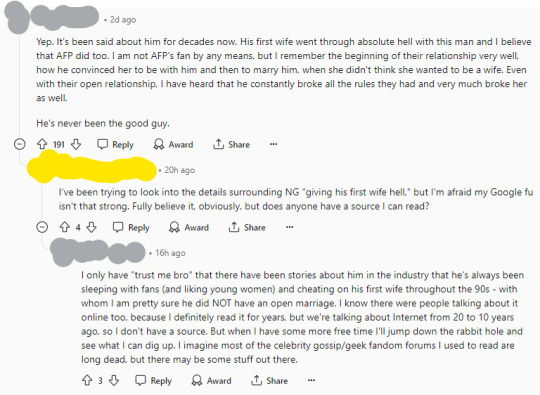


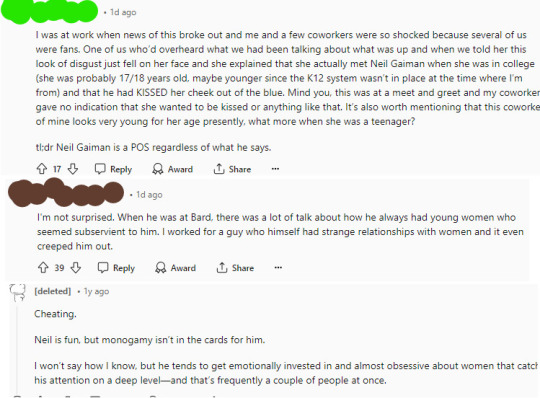

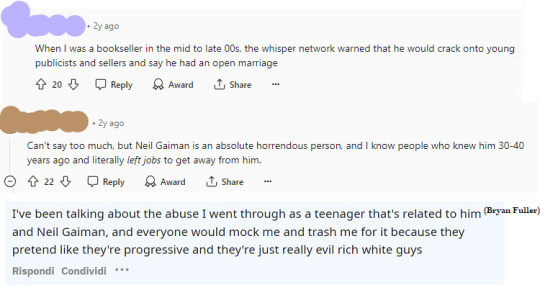

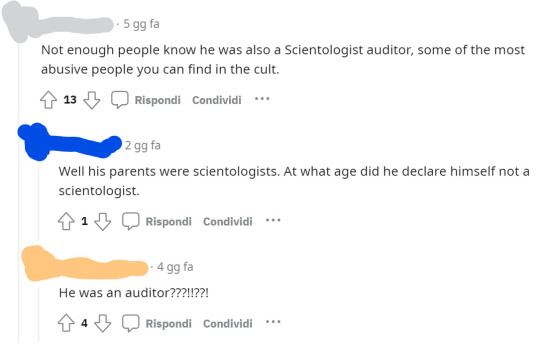


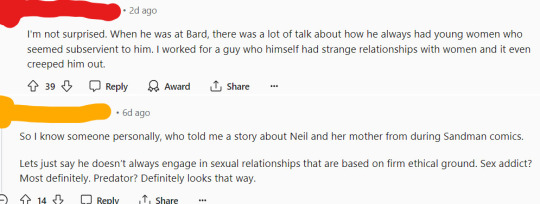
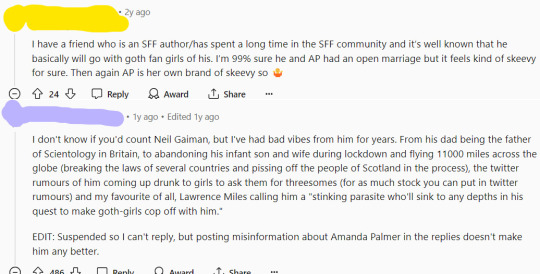
(in the reblogs there's more screenshots of testimonies from people in the publishing world and fans, there's enough proof to say this was a consistent way of behaving around young fans and workers).
1K notes
·
View notes
Note
Mr. Gaiman, how do you process grief? sorry I come here and ask this out of nowhere, but somehow I feel like you're the only person who can explain it to me. lost my dad two months ago and I feel like it's only gotten worse.
I'm so sorry for your loss.
You process grief slowly, at your own pace and in your own way.
Time will heal, or at least scab over the wound. And in the meantime, you keep on going because the world will keep on going.
It's okay to cry, okay not to cry. When my father died I didn't cry for him for months, until one day I was reading a story by a friend and someone died in the story I'd only met a few pages earlier and I found myself weeping like a baby. And then I started to surface from the numbness and the pain.
Don't let anyone tell you what they think you should be feeling. And if they do tell you, ignore them.
There isn't a schedule for this stuff. There's just grief and time.
5K notes
·
View notes
Text
Prime Video: So, Good Omens Season 2
Neil Gaiman: Yes
Prime Video: What‘s the Story?
Neil Gaiman: No story, just vibes.
Prime Video: Neil, we need a little more to work with.
Neil Gaiman: Okay, do you remember Sister Theresa Garrulous and Sister Loquacious from Season 1?
Prime Video: Yes?
Neil Gaiman: They‘re in a coffee shop AU.
Prime Video: Aaaand?
Neil Gaiman: And they need to fall in love.
Prime Video: But Neil what about Crowley and Aziraphale?
Neil Gaiman: Oh, don‘t worry. They‘re already in love.
46K notes
·
View notes
Text
Sir Terry Pratchett: on writing Good Omens with Neil Gaiman
I love the whole interview but this little snippet most of all:
Terry: “You can usually bet, and I’m sure Neil Gaiman would say the same thing, that, uh, if I go into a bookstore to do a signing and someone presents me with three books, the chances are that one of them is going to be a very battered copy of Good Omens; and it will smell as if it’s been dropped in parsnip soup or something in and it’s gone fluffy and crinkly around the edges and they’ll admit that it’s the fourth copy they’ve bought”.
You can never own enough Good Omens copies.
16K notes
·
View notes
